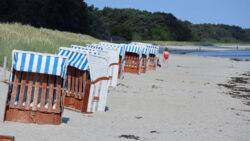An accident at a sewage treatment plant in western Latvia has caused a large spill of untreated waste into the Baltic Sea, leading to the closure of beaches and a ban on swimming, local authorities said Monday.
At least 1,250 tonnes of waste containing sulphurous sludge leaked out following the collapse on Sunday of a wall at the plant in Liepaja, a coastal city of 70,000.
“We don’t know when we will manage to fix the broken sludge tanks, which is why I advise all residents of Liepaja to pour less water down the toilet, because now all the sewage is being discharged into the open sea,” Liepaja mayor Gunars Ansins told LTV1 television channel.
Latvia’s health inspectorate ordered the closure of all beaches from the border with Lithuania in the south to the town of Pavilosta, 40 kilometres (25 miles) north of Liepaja, and banned swimming in the Baltic Sea.
“There is no threat to people’s health. We are doing everything possible to stop the discharge of pollution into the Baltic Sea as soon as possible,” Ansins said in a separate announcement on the city’s website, adding that the water quality was being monitored.
The national environmental protection service has opened an investigation into the accident, saying 400 tonnes of waste an hour continued to wash up in the sea.
“The waste management system is capable of storing 21,000 cubic metres of liquid waste, but this capacity is only enough to last two days, so we are building a temporary pipe to bypass the collapsed part of the recycling plant,” Andis Dejus, CEO of utility company Liepajas Udens, which operates the municipal water supply and recycling systems, told reporters.
Dejus noted that the damaged building was relatively new, having been built in 2009.
Geologist Baiba Grinberga said on her Facebook account that “geotechnical studies 20 years ago had already revealed (the existence of) unstable ground in the region but the recycling plant had been built anyway”.
(AFP)





